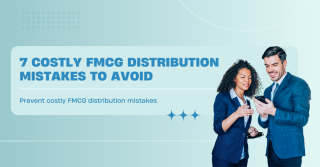Streamlining Food Order Management through Sales Automation
_1742534627.png)
The food industry operates in a fast-paced, highly competitive environment where efficiency and customer satisfaction are paramount. Companies must juggle inventory management, customer orders, and field sales operations, all while ensuring seamless communication between departments. Relying on manual processes in such a dynamic industry often leads to inefficiencies, delayed deliveries, and costly errors that impact overall business performance.
However, with the advent of sales automation, businesses now have the opportunity to transform their operations. Sales automation solutions streamline order management, enhance customer relationships, and drive overall growth by eliminating redundancies and optimizing workflows. In this article, we will explore how leveraging automation tools can help food businesses improve sales performance, customer satisfaction, and operational efficiency.
Chaos of Traditional Order Management
Challenges of Manual Processes
Imagine this scenario: A restaurant supplier receives an urgent bulk order from a key client, but due to outdated manual tracking, they are unable to confirm product availability immediately. As a result, the supplier experiences stock shortages, order fulfillment delays, and ultimately, an unhappy customer. Unfortunately, such inefficiencies are common in the food and beverage industry, where managing perishable goods requires real-time tracking and seamless coordination.
Some of the major drawbacks of manual order management include:
Human Errors: Data entry mistakes, incorrect inventory counts, and misplaced orders can lead to miscommunication and financial losses.
Delayed Order Processing: Without automation, order approvals, confirmations, and fulfillment often take longer than necessary.
Lack of Real-Time Insights: Traditional order management relies on fragmented spreadsheets, making it difficult to assess current stock levels and forecast future demand accurately
Poor Coordination Between Teams: Sales representatives, warehouse managers, and delivery personnel often struggle with misaligned data, causing further delays in the supply chain.
Revenue Losses: Missed sales opportunities and unfulfilled orders due to inefficiencies can lead to dissatisfied customers and lost revenue.
Given these limitations, it is clear that businesses need a more robust solution to manage orders efficiently and reduce the risk of errors.
Automating the Flow: The Power of Sales Automation
Sales automation is a game-changer for the food industry. By leveraging advanced technology, businesses can eliminate inefficiencies, optimize operations, and enhance customer experiences. Sales automation tools integrate seamlessly with inventory management systems, allowing companies to track orders in real time, streamline sales processes, and improve coordination across departments.
Key benefits of sales automation include:
Seamless Order Management with Instant Data Access
One of the most significant advantages of sales automation is real-time data synchronization. Instead of relying on disconnected spreadsheets or outdated manual logs, businesses can access a centralized dashboard that provides up-to-date information on orders, stock levels, and customer details.
- Minimized Order Errors: Automated order processing reduces human errors by eliminating manual data entry.
- On-Time Deliveries: With better coordination between sales and logistics teams, businesses can ensure timely order fulfillment.
- Data-Driven Decision-Making: Business owners and managers can analyze trends, predict demand, and optimize inventory levels based on real-time insights.
Optimizing Sales Performance with Field Automation
For food and beverage businesses that rely on field sales representatives, tracking sales performance and customer interactions is often challenging. Sales automation equips field teams with mobile-accessible solutions, enabling them to manage orders, update client details, and monitor their progress on the go.
- Better Visibility: Managers can track sales activities, monitor field reps, and measure performance in real time.
- Route Optimization: Automated sales tools provide route optimization features, allowing sales reps to complete more visits and improve efficiency.
- Customer Relationship Management (CRM): Automation ensures that customer details, past orders, and preferences are readily available, enabling personalized service and improving client retention.
Enhanced Customer Experience and Loyalty
Customer satisfaction is the backbone of success in the food industry. With sales automation, businesses can:
- Provide instant order confirmations and tracking updates
. - Offer personalized recommendations based on past purchases.
- Reduce waiting times and improve order accuracy.
- Strengthen communication between sales reps and clients, leading to better relationships and repeat business.
A Game-Changer for Food Businesses
Choosing the right sales automation tool is crucial for business success. Delta Sales App is a powerful field sales software designed specifically for food and beverage businesses, helping them streamline order management and maximize efficiency.
With Delta Sales App, businesses can:
- Manage unlimited products and track customer orders effortlessly.
- Gain valuable sales insights through analytics to optimize strategies.
- Monitor field sales employees for improved accountability and productivity.
- Utilize lead and opportunity tracking to prioritize business growth.
- Enhance team collaboration through real-time communication features.
By integrating Delta Sales App into their daily operations, food businesses can eliminate inefficiencies and focus on market expansion.
Why the Future of Food Industry is Automated?
Automation is no longer a luxury—it is a necessity for businesses looking to stay ahead of the competition. The food industry thrives on speed, accuracy, and customer satisfaction. By eliminating delays, reducing errors, and enhancing the overall sales experience, sales automation ensures businesses remain competitive.
Some key industry trends supporting automation include:
- Artificial Intelligence (AI) in Sales Forecasting: AI-powered automation tools help businesses predict demand and optimize inventory management.
- Cloud-Based Sales Solutions: Cloud integration allows businesses to access data from anywhere, improving flexibility and scalability.
- Integration with E-commerce Platforms: Businesses can seamlessly connect their sales automation tools with online marketplaces to drive sales growth.
- Mobile Sales Applications: Field sales teams benefit from mobile-accessible platforms that improve efficiency and customer engagement.
Conclusion: Embrace Automation, Elevate Your Business
Sales automation is reshaping the way food businesses operate. By streamlining order management, optimizing sales performance, and providing real-time insights, companies can achieve higher efficiency and customer satisfaction.
With tools like Delta Sales App, businesses can take control of their sales processes, eliminate operational roadblocks, and focus on scaling their operations. Whether you are a small supplier or a large distributor, embracing automation will help you stay competitive in the evolving market landscape.
The future is digital—don’t get left behind!








